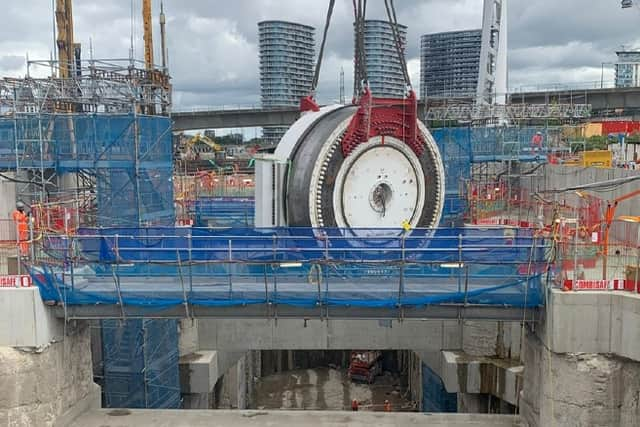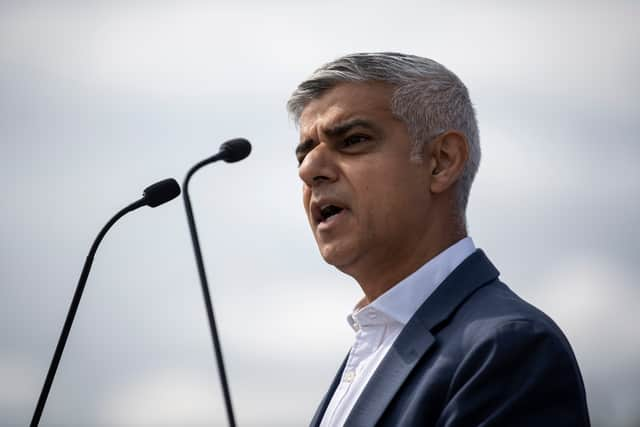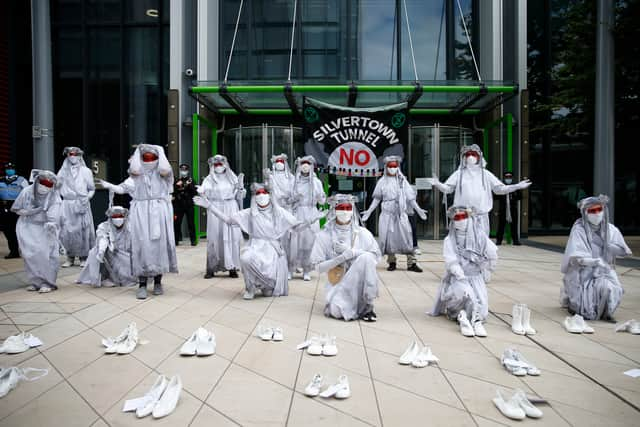Silvertown Tunnel: What is Sadiq Khan’s TfL infrastructure project, and why the protests?
and live on Freeview channel 276
Decried by his critics as liable to drastically increase pollution levels and pitched by his team as key to cutting congestion around the Blackwall Tunnel, the Silvertown Tunnel is one of Sadiq Khan’s largest and most controversial projects given the go-ahead during his time as mayor.
Earmarked to open in 2025, the £2bn scheme will link Greenwich with Silvertown in Newham via a tunnel running beneath the River Thames, the first in London for more than 30 years.
Advertisement
Hide AdAdvertisement
Hide AdAccording to Transport for London’s (TfL) website, the tunnel will include a toll and greater cross-river public transport, which “will improve the reliability and resilience of the wider road network”.
However, the work has come under repeated criticism, from groups including campaigners, London Assembly members (AM) and academics, who claim it will significantly increase carbon emissions and drive up traffic in some of the capital’s most polluted streets.
Here, we take a look at the proposed benefits of the Silvertown Tunnel, and some of the key concerns related to the project.
Why is the Silvertown Tunnel being built?
Plans for a tunnel connecting Silvertown and Greenwich have been bandied around since Ken Livingstone, before being brought to public consultation under Boris Johnson. However, it was Mr Khan who awarded a contract for its construction in 2019.
Advertisement
Hide AdAdvertisement
Hide AdSince then, he has consistently argued the work is essential to reduce congestion around the nearby Blackwall Tunnel, and will provide more public transport links between Greenwich and Newham.
These will include new, zero-emission, cross-river bus services, with a commitment to running at least 20 buses per hour in each direction once it opens.
The plans also involve major regeneration on both sides of the river, to deliver improvements to walking, cycling, and the areas near the tunnel entrances.
TfL’s website notes it expects the Silvertown Tunnel to “effectively eliminate delays and queues at the Blackwall Tunnel”, making journeys up to 20 minutes faster, reduce the local environmental impact from traffic, and provide more opportunities to cross the river, due to additional public transport options.


Advertisement
Hide AdAdvertisement
Hide AdA spokesperson for the mayor has previously told LondonWorld: “The Silvertown Tunnel will transform the way people can travel in a part of London that currently has few options for crossing the Thames.
“In addition to providing new, zero-emission, cross-river bus services, the tunnel will address the chronic vehicle congestion currently associated with the inadequate, Victorian-era Blackwall Tunnel, and give greater resilience and flexibility to the only strategic road crossing in east London. A new user charge on both tunnels will ensure there is no increase in traffic overall.
“TfL is committed to running at least 20 buses per hour in each direction when the new tunnel opens, with the potential for this to increase up to 37 buses per hour as demand grows over time. This will provide a significant increase in public transport capacity in east London.”


What are some of the concerns?
Opposition to the project has centred around the claim from TfL and Mr Khan that it will cut carbon emissions, due to its investment in public transport and alleviating congestion around the Blackwall Tunnel.
Advertisement
Hide AdAdvertisement
Hide AdThe Stop the Silvertown Tunnel Coalition is among those to have repeatedly queried the argument that the scheme is compatible with greenhouse gas emissions reduction targets.
The coalition claims that, rather than lighten congestion, the Silvertown Tunnel will instead result in 30,000 new vehicle journeys, worsening the air quality in communities already struggling with high levels of pollution.


In 2021, pollution expert Professor Frank Kelly was one of 40 people to sign a letter urging the mayor to scrap the project due to it providing additional provision for cars in London.
Speaking to LondonWorld earlier this year on the topic, Green Party Assembly Member Zack Polanski said: “Ultimately, the main point here is about induced road demand, and there’s a very simple principle that if you build more roads, that creates more traffic.
Advertisement
Hide AdAdvertisement
Hide Ad“So the mayor always frames this as an argument for reducing congestion, but we know that argument is nonsense. And ultimately, if you’re trying to clear up the air, and everything he is doing correctly with the ULEZ, is then being contradicted by building a road tunnel.”
More recently, a paper published by four Imperial College academics found that in order to meet a key carbon budget, there needs to be a 72% reduction in car travel activity, among other measures, in the capital by 2025.
Several recommendations were listed as to how the target can be achieved, including an “immediate halt in urban road building projects and existing roads repurposed to prioritise active transport”, such as the Silvertown Tunnel, “built to facilitate more river crossings in cars”.
Following the report’s publication, Simon Pirani, a Greenwich resident and honorary professor at the University of Durham speaking on behalf of the Stop the Silvertown Tunnel Coalition, said: “For the last three years, City Hall has responded to our protests time after time by claiming that building the tunnel is compatible with meeting greenhouse gas emission reduction targets, to help tackle climate change. This report blows those claims out of the water.”
Advertisement
Hide AdAdvertisement
Hide AdThe group is now calling for the mayor to initiate a review into the project, suggesting it could “facilitate consideration of alternative uses for the tunnel”.
This, the Coalition hopes, may prevent the damaging rise in vehicles it predicts the tunnel will encourage if progressed in its current guise.
Sign up for our newsletter for the latest updates, and follow LondonWorld on Facebook, Twitter, Instagram and TikTok.
